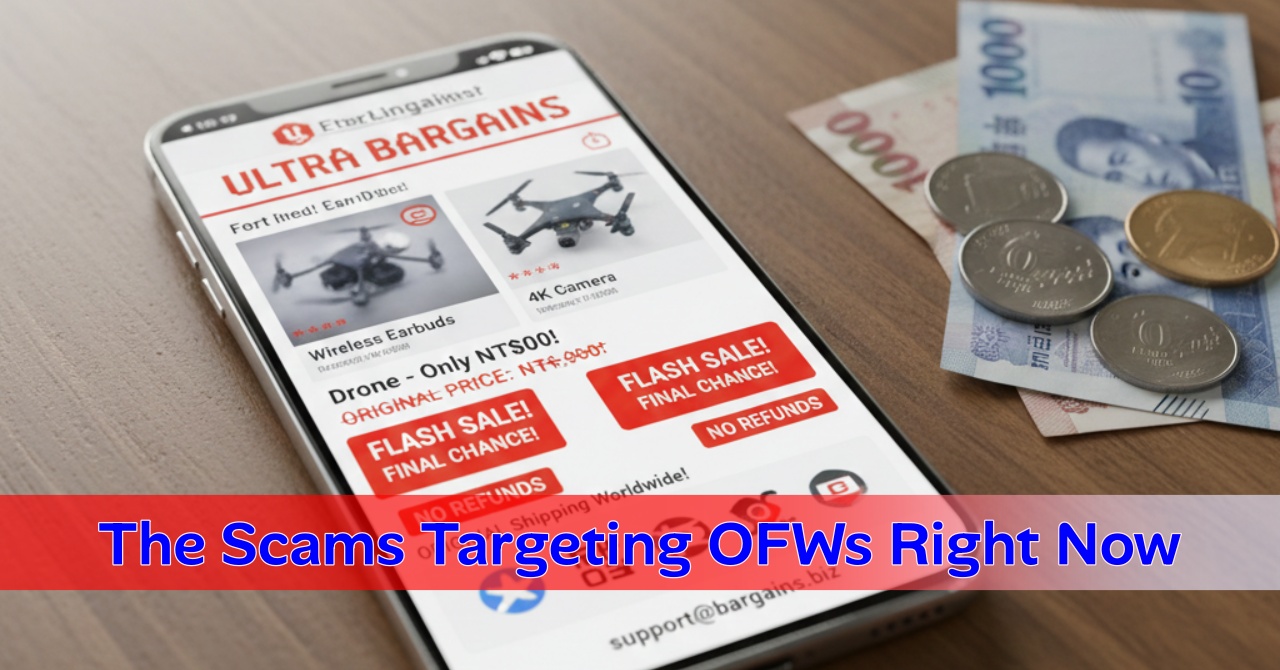Every Christmas season, I look forward to sending gifts home, preparing my balikbayan box, and helping my family shop online. But if there’s one thing I’ve learned while working abroad, it’s this: the holidays are also the peak season for scammers. And for us OFWs in Taiwan, the risk feels even higher because we’re far away. We want to give more during Christmas, we want to make our families happy, and that makes us easy targets.
This year, the Philippines is seeing a surge in holiday scams. And many of these scams directly affect OFWs in Taiwan, especially those of us in factories, caregiving work, and long-hour jobs. We’re busy, tired, and emotionally vulnerable during the holidays. Scammers know that.

Why OFWs in Taiwan Are at Risk During the Holidays
We’re generous. We send gifts. We shop online. We help our families buy things they need. And during the holidays, emotions run high. These habits create openings for scammers.
Here are the top scams affecting us:
Online Shopping and Fake Delivery Scams
Almost every OFW I know buys something online for their family during Christmas. Some of us order from Shopee or Lazada. Others buy from retailers in Taiwan and use third-party sellers to send them home.
This is where scammers step in.
They create:
- Fake Facebook shops that look like real brands
- Scam pages offering big holiday discounts
- Fake delivery riders asking for COD
- Bogus tracking links to make the purchase look “real”
The danger?
Your family might pay for a package you never ordered. Or worse, you might send money to a seller who never sends anything.
I’ve seen OFWs cry over this. The worst part is the guilt—because the scam happens in our name.
Love Scams and Investment Scams
The holidays can be lonely when you’re abroad. And loneliness is exactly what scammers are targeting.
They start with friendly chats. Then they build “romance.” After that comes the script:
- “I want to visit you, but I need money for the ticket.”
- “Can you help me invest? Guaranteed profit, promise.”
- “Let’s build something together before Christmas.”
They mix money, love, and emotional pressure.
And every year, OFWs lose thousands of NT to someone who never loved them in the first place.
If someone you met online is suddenly needing money, that’s your red flag.
Loan Scams and “Easy Task” Scams
When December comes, many OFWs want extra cash. Some of us take small loans or accept side gigs online. Scammers know this.
Their common lines look like this:
- “Kailangan mo ng pera? Approve ka agad!”
- “Do small tasks and earn NT$3,000 a day.”
- “Just pay this fee to activate your loan.”
Some loan apps even steal your contacts, photos, and personal files. They use these to threaten or blackmail OFWs.
In Taiwan, where we rely on our phones for everything, this can feel overwhelming.
Impersonation and Middleman Scams
This one hurts the most because scammers use our family’s names.
They hack Messenger accounts and pretend to be your:
- Sibling
- Cousin
- Parent
- Close friend
Then they message you urgently:
- “Ate, emergency, pa-send sa GCash.”
- “Kuya, may kailangan lang ako pang-bayad.”
When you’re far away, it’s easy to panic.
But scammers depend on that panic to make you send money quickly.
Some also pose as middlemen for:
- Gadgets
- Balikbayan box services
- Seasonal shipping promos
They offer cheap prices you want to believe—especially when you’re trying to save.
How OFWs in Taiwan Can Protect Themselves
Here’s the practical checklist I follow every holiday season. Feel free to share this with your family back home.
- Online Shopping
- Buy only through official apps like Shopee, Lazada, Amazon, PChome, or Momo.
- Avoid sending money through GCash or bank transfer to private sellers you don’t know.
- Check the reviews, not just the photos.
- Delivery Scams
- If your family receives COD, tell them to call or message you first before paying.
- Track all packages only through official courier websites.
- Love/Investment Scams
- If someone online asks for money, stop and think.
- No legit investment promises “sure profit.”
- Protect your savings. It’s not worth losing months of hard work.
- Loan Scams
- Avoid unknown loan apps with no physical address.
- Use lenders that are licensed by the SEC or bank-based.
- Never send ID photos to random apps.
- Impersonation
- If a “relative” messages you asking for money, call them.
Voice confirmation saves you from so many scams.
- Middleman Scams
- For remittance: use official channels like Western Union, Remitly, BDO Remit, or GCASH Overseas.
- For shipping: choose accredited couriers or companies recommended by other OFWs.
Final Word for OFWs in Taiwan
We work hard to support our families. We sacrifice time, energy, and sometimes even our happiness. And every Christmas, scammers try to take advantage of that generosity.
But we’re wiser now. We’re more aware. And we can protect ourselves by staying vigilant.
If you or your family suspect a scam, report it through:
Philippine Anti-Scam Hotline: 1326
eGov PH App Complaints Section
Your income is hard-earned. Your savings matter.
And no scammer should ever take that away from you.
